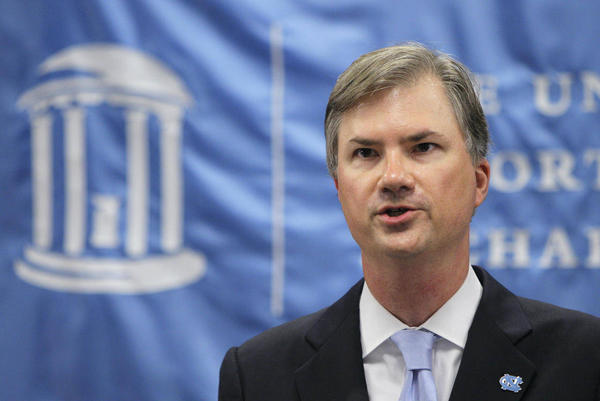College Sports Needs To Rethink Its Leadership Structure
Posted by Chris Johnson on June 7th, 2013Chris Johnson is an RTC Columnist. He can be reached @ChrisDJohnsonn.
The relationship between the NCAA and the schools it governs has grown more tense and distrustful over president Mark Emmert’s tenure. This is a simple observation – anyone who watches, reads or writes about college sports can’t go more than a few weeks without catching wind of some new bureaucratic squabble. But without digging deep and realizing the systemic disconnect that defines the relationship between the NCAA and the people its rules actually affect, it is impossible to comprehend just how incompatible the organization has become with everything college athletics, and their place within the larger academic missions of their respective universities, should be. Outgoing North Carolina Chancellor Holden Thorp’s comments Thursday upon leaving his post at UNC and moving on to D-III Washington University in St. Louis get at the core of what has been the NCAA’s most glaring issue under Emmert (and even before that): Sports people aren’t making sports decisions. People in academia are.

Being a president at a high major university means getting involved with important matters better-reserved for more qualified athletic department officials. Thorp saw the need for a redistribution of power, and resigned from his position to avoid further consternation (AP).
“Either we put the ADs back in charge and hold them accountable if things don’t work,” Thorp said in April during a campus forum, “… or let’s be honest and tell everyone when we select (presidents) to run institutions that run big-time sports that athletics is the most important part of their job.”
That sounds crazy, when you really think about it. Proposals to change inane bylaws and recruiting restrictions and scholarship limitations are being voted and ingrained into the NCAA’s rulebook by high-brow yes-men, the type of people who get up on stage at an athletic council meeting, get cozy behind a microphone and insolently mock everything from entire athletic conferences to religion stereotypes to individual coaches. College presidents, powerful leaders with academic backgrounds, are the ones taking the reins on the same issues athletic departments and coaches spend months and years wringing their hands about. If this presidential control model seems insanely ill-fitting, or just plain dumb, blame the Knight Commission on Intercollegiate Athletics, a group founded in the early 1990s to address the growing unease among educators of athletic departments’ lax enforcement of rule and regulations. Their solution – such as it was – was to hand control to the presidents and chancellors, esteemed educators with no specific experience dealing with the dizzying complexities of college athletics. The leaders of massive public universities would work with the NCAA to come up with reasoned solutions on how to address the problems athletic departments let linger far too long. ADs and other athletic department officials had it all wrong. Let’s hand this over to the presidents. They’re smart, right? They can handle this. They know exactly what they’re doing.
Except they don’t, and the NCAA’s failure to recognize that simple fact is what leads a chancellor at one of the nation’s most reputable athletic and academic institutions to resign and seek out a similar position at a lesser-known scholastic entity. College presidents should be responsible for furthering the academic missions of their respective institutions, and leaving the minutiae of athletic competition to the people who oversee, coach and play in those competitions. The cross-pollination of uninformed university leaders trying to make decisions on behalf of undeniably more qualified, more deeply-invested, experienced individuals at the ground level – athletic directors, maybe? – just seems sort of silly. ADs at various schools are already voicing concerns about having their academic-reared superiors make decisions that directly determine how they do their own jobs, and the contempt has grown into something like a miniature if under-the-surface groundswell for demanded change. If the heads of athletic departments aren’t working with Emmert to try and solve some of college athletics’ biggest issues, at bare minimum their voices deserve an influential place in the decision making process.
Over the past three years, Thorp has watched his school’s estimable athletic program publicly berated with allegations of academic violations and amateurism-related misconduct. He saw the time and nuanced thinking required to make sensible decisions about college athletics, and how plainly unqualified he – and most other college presidents – were to be voting and arguing and recommending policy change in lieu of athletic people with athletic interests and significant athletic experience. He realized how precariously unstable the athletics-academic balance under Emmert has become, and what the growing unrest among neglected athletic directors could mean for the NCAA’s perilous outlook.
The various gripes about the NCAA’s byzantine rulebook, its morally suspect amateurism model, are real problems worth addressing. The misalignment of power at the top, the dynamic that forces people like Thorp to get bogged down in pervasive problems and rules he has no business making decisions about, is a more serious issue requiring a more serious reevaluation of leadership in college sports. How about we try letting people in sports control what happens in sports, and leave the bigger academic issues to the presidents and chancellors? That model may have worked in the past, when college athletics wasn’t a billions-spewing cash-cow industry. It can’t possibly work in today’s landscape. College sports is an enormously powerful enterprise on its own; academics inhabit a distinctly separate (and frankly, more important) realm of higher learning. The leadership structure must change to accommodate that philosophical and institutional divide.












































